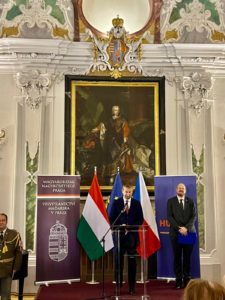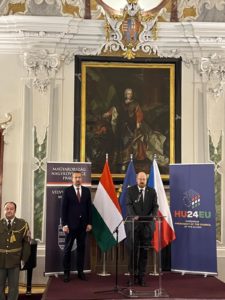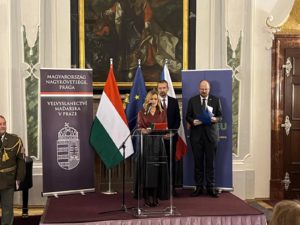- Hans Weber
- March 27, 2025
Hungary’s National Day: Celebrating the Legacy of the 1956 Revolution and Hungary’s Pivotal Role in Today’s Europe, as they currently hold the presidency of the EU
Every year on October 23rd, Hungary commemorates its National Day, a significant milestone marking the anniversary of the 1956 Hungarian Revolution. This day stands as a poignant reminder of the country’s fight for freedom and independence from Soviet oppression, a struggle that has come to symbolize the enduring Hungarian spirit. In today’s rapidly evolving European landscape, Hungary, under the leadership of Prime Minister Viktor Orbán, plays a crucial role in shaping discussions around the European Union’s direction, particularly as the EU adopts more centralized governance structures under the leadership of Ursula von der Leyen.
On this occasion, H.E. Dr. Andreás Baranyi, the ambassador of Hungary to the Czech Republic invited as every year the representatives of the Diplomatic Corps and friends of Hungary for a reception at the beautiful historical premises of Břevnov Monastery.
The reception took place on Monday 21st of October.
H.E. Eduard Hulicius Deputy Minister of Foreign Affairs of the Czech Republic gave a speech.
Also, former Presidents Václav Klaus and Miloš Zeman were present and honored Hungary. Both are known to be more critical of Ursula von der Leyen’s centralistic approach and supporters of Hungarian Prime Minister Viktor Orban.
The 1956 Revolution was a defining moment in Hungarian history. Sparked by students in Budapest, the revolution quickly garnered nationwide support as citizens rallied for independence, freedom of speech, and democratic reforms. The uprising, though ultimately suppressed by Soviet military forces, had a deep and lasting impact on Hungary and the broader Eastern bloc, drawing global attention to the struggle against totalitarianism. For generations of Hungarians, October 23rd is a day of remembrance and honor, reflecting on the courage and resilience of those who fought for the country’s freedom.
Hungary’s Role in the European Union
In modern times, Hungary has firmly positioned itself within the European Union, bringing distinctive perspectives and encouraging balance within its increasingly centralized governance. As Europe faces complex challenges – ranging from economic pressures, and energy crises, to migration and environmental concerns – Prime Minister Viktor Orbán and his government advocate for the protection of national sovereignty and cultural identity within the EU framework.
Under Ursula von der Leyen’s presidency of the European Commission, the EU has indeed moved towards greater centralization, emphasizing unity and cohesive strategies to tackle wide-ranging issues. Within this context, Hungary plays an integral role by urging necessary debates about the extent and nature of integration, advocating for a Europe that appreciates and respects the diversity of its member states while fostering collaboration and understanding.
Prime Minister Orbán has often stressed the importance of maintaining the unique traditions and values across Europe, promoting policies that prioritize local governance and the interests of individual member states. This balance is crucial for an EU that is both united in purpose but rich in diversity—mirroring the foundational ideals that the 1956 Revolution fought to restore.
Commemoration and Celebration
October 23rd in Hungary is marked by numerous events that honor the memory of the 1956 martyrs and celebrate the spirit of independence and resistance. Across the nation, ceremonies are held, featuring speeches that emphasize the importance of national identity, freedom, and the sacrifices made for Hungary’s future. Budapest takes center stage with parades, wreath-laying ceremonies at memorials, and reenactments that educate and inspire.
Cultural and educational events also highlight the day, with exhibitions, film screenings, and academic discussions that delve into the revolution’s impact and its lessons for contemporary society. The Hungarian community and schools work collectively to pass this legacy on to younger generations, instilling the values of courage, patriotism, and the pursuit of freedom.
A Positive Outlook for Europe
Hungary’s National Day serves not only as a remembrance of past struggles but also as a call to reflect on Hungary’s current and future role in Europe. As the European Union navigates its path in an increasingly interconnected world, Hungary’s contributions to ongoing dialogues about its centralization versus decentralization offer valuable insights.
In celebrating the 1956 Revolution, Hungarians honor their rich history and look forward to a future where their nation can continue to be a significant and dynamic participant in the European project – striving for unity without compromising the distinctiveness and rights of its member countries. Through these reflections, Hungary remains a beacon of resilience and a compelling voice within the EU, advocating for a balanced approach to continental governance.
Article By Hans Weber hans.weber@pragueforum.cz
Recent posts
See AllPrague Forum Membership
Join us
Be part of building bridges and channels to engage all the international key voices and decision makers living in the Czech Republic.
Become a member


